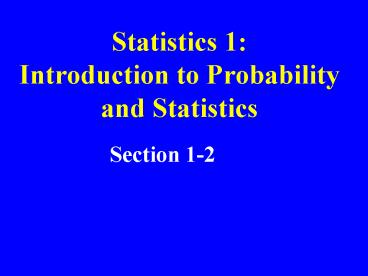Statistics 1: Introduction to Probability and Statistics - PowerPoint PPT Presentation
1 / 26
Title:
Statistics 1: Introduction to Probability and Statistics
Description:
the value of 'x' determines the value of 'y' The average is a function of a ... the population) if it is collected in a well-planned and well-executed manner ... – PowerPoint PPT presentation
Number of Views:2537
Avg rating:3.0/5.0
Title: Statistics 1: Introduction to Probability and Statistics
1
Statistics 1Introduction to Probability and
Statistics
- Section 1-2
2
More Definitions
- Parameter
- a numerical characteristic of a population
- population parameter
3
More Definitions
- Statistic
- a numerical characteristic of a sample
- sample statistic
4
Examples of numerical characteristics
1. Average or Mean 2. Biggest (maximum)
value 3. Smallest (minimum) value 4. Range
maximum - minimum
5
A Statistic is
- A function of data
- Function y f(x)
- the value of x determines the value of y
- The average is a function of a set of x values
the average of 4, 6, and 8 6.
6
Start with the sample or the population?
- Sometimes we have a sample and we need to
consider the population or populations that the
sample represents
7
Start with the sample or the population?
- A sample is likely to be representative (it
looks like the population) if it is collected in
a well-planned and well-executed manner
8
The Nature of Data
9
Definitions
- Quantitative vs. Qualitative
- Discrete vs. Continuous
- Four levels of measurement
10
Definitions
- Quantitative vs. Qualitative
11
- Quantitative Data are numbers that represent
counts or measurements
12
- Qualitative Data may represent categories based
on a non-numerical characteristic - Sometimes called categorical or attribute data
13
Definitions
- Discrete vs. Continuous
14
Definitions
- Discrete
- The set of possible values can be counted
(possibly infinite) - Main example Counts
15
Definitions
- Continuous
- The possible values cannot be counted. Even in a
small range, the possibilities are infinite. - Main example Measurements
16
Definitions
- Four levels of measurement
- Nominal
- Ordinal
- Interval
- Ratio
17
Definitions
- Four levels of measurement
- Nominal
- name
- not quantitative
- cannot compare magnitudes
18
Definitions
- Four levels of measurement
- Nominal
- New York, San Francisco, Sacramento, Lodi
- Other attributes of these cities can be compared
as quantities, but not the names
19
Definitions
- Four levels of measurement
- Ordinal
- names or categories
- not quantitative
- can be compared in magnitude as less than or
greater than only
20
Definitions
- Four levels of measurement
- Ordinal
- small, medium, large
- can be put in order according to magnitude, but
other comparisons cannot be done
21
Definitions
- Four levels of measurement
- Interval
- values represent magnitude explicitly
- can be put in order, and
- intervals can be compared, but
- ratios cannot be compared
22
Definitions
- Four levels of measurement
- Interval
- Temperatures
- 0oC, 10oC, 20oC
- can be put in order
- interval from 0 to 10 is the same as 10 to 20
23
Definitions
- Four levels of measurement
- Interval
- Temperatures
- 0oC, 10oC, 20oC
- 20 is not twice as hot as 10
24
Definitions
- Four levels of measurement
- Interval
- These temperatures are the same
- 0oC, 10oC, 20oC 20 ? 10 2
- 32oF, 50oF, 68oF 68 ? 50 1.36
- 273oK, 283oK, 293oK 293 ? 283
1.04
25
Definitions
- Four levels of measurement
- Ratio
- Values represent magnitude explicitly
- Can be put in order
- Intervals can be compared
- Ratios can be compared
26
Definitions
- Four levels of measurement
- Ratio
- Natural not arbitrary zero
- Speed, weight, elapsed time, voltage, distance
- 60 miles per hour is twice as fast as 30 miles
per hour

